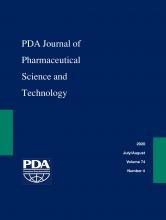Abstract
Endotoxins, heat-stable lipopolysaccharides from Gram-negative bacteria, are potential contaminants that can be introduced during manufacturing of pharmaceutical products, including vaccines. Parental pharmaceutical products undergo endotoxin testing because endotoxins are pyrogenic in humans and can induce severe physiological reactions. Currently, animal-derived Limulus amoebocyte lysate (LAL) assays are widely used. Assays using recombinant factor C (rFC), a nonanimal-derived reagent, have been proposed as alternatives. Some components in the matrices of pharmaceutical products can interfere with these assays. We compared two LAL- and two rFC-based assays for endotoxin detection in four complex human vaccine matrices. We showed that the results for the rFC-based assays were at least equivalent to those for the LAL-based assays, although the rFC-based assays were found to be adequate but slightly less suitable for one of the products that contained proteases as the methods used to inactivate the proteases reduced the assay performance. Likewise, LAL was adequate but less suitable for another product that contained glucans. The rFC assays offer a number of benefits, including compliance with the principles of the 3Rs, i.e., replacement, reduction, and refinement of animal testing by safeguarding animal welfare and promoting more ethical and sustainable use of animals for testing. After they are fully validated, as per the compendial requirements, they could be considered as suitable replacement assays for the detection of endotoxin in the manufacturing processes of pharmaceutical products. In summary, we demonstrated that both LAL and rFC assays are adequate for testing and releasing four vaccine products.
- © PDA, Inc. 2020
PDA members receive access to all articles published in the current year and previous volume year. Institutional subscribers received access to all content. Log in below to receive access to this article if you are either of these.
If you are neither or you are a PDA member trying to access an article outside of your membership license, then you must purchase access to this article (below). If you do not have a username or password for JPST, you will be required to create an account prior to purchasing.
Full issue PDFs are for PDA members only.
Note to pda.org users
The PDA and PDA bookstore websites (www.pda.org and www.pda.org/bookstore) are separate websites from the PDA JPST website. When you first join PDA, your initial UserID and Password are sent to HighWirePress to create your PDA JPST account. Subsequent UserrID and Password changes required at the PDA websites will not pass on to PDA JPST and vice versa. If you forget your PDA JPST UserID and/or Password, you can request help to retrieve UserID and reset Password below.






